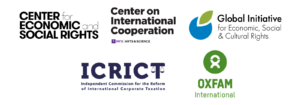
How to Achieve Tax and Debt Justice
February 11, 2025 | 8:15—9:45 a.m. (EST)
777 United Nations Plaza, 8th Floor
New York, NY 10017
Hosted by NYU Center on International Cooperation
Co-organized by Oxfam International, Independent Commission for the Reform of International Corporate Taxation (ICRICT), Global Initiative for Economic, Social and Cultural Rights (GI-ESCR), NYU Center on International Cooperation, and Center for Economic and Social Rights (CESR)
Register for the event
Multilateralism and the UN have been impacted by the inequality crisis and the extreme concentration of wealth with the world’s richest 1 percent accumulating more wealth than 95 percent of humanity. These are two key elements to understand the Sustainable Development Goal (SDG) funding gap and the impediments to advance multilateral progressive reforms on key topics like international tax cooperation and the reform of the current debt architecture.
Debt and tax are precisely two of the most important areas to reduce inequality. The most ambitious proposals on these areas come from Latin America and Africa (the Brazilian-G20-led proposal to tax the super-rich, the creation of PTLAC, the UN Framework Convention on International Tax Cooperation and the proposal for a UN debt workout mechanism). The Financing for Development (FfD) 4 process with discussions on the tax agenda and on debt architecture is a critical opportunity for governments committed to reduce global and domestic inequalities to advance a global inequality reduction agenda with two key elements: tax justice and achieving debt justice.
This side event organized by Oxfam International, Independent Commission for the Reform of International Corporate Taxation (ICRICT), Global Initiative for Economic, Social and Cultural Rights (GI-ESCR), NYU Center on International Cooperation, and the Center for Economic and Social Rights (CESR), will emphasize the big opportunity that the international community has during FfD4 to reduce domestic and global inequality in 2025 in parallel to closing the financing for sustainable development gap. To do so both economic and political inequality must be at the core of the discussions. Specifically, this side-event will focus on the critical role of international tax cooperation and progressive taxes (i.e., taxing the super-rich) and debt justice to fight inequalities and how FfD4 can create a global momentum for that and support the UNFCITC negotiations and advance in UN Debt Convention. Panelists will specifically explore why tackling inequality should be at the center of the FfD discussions and how this could be materialized, how taxing the super-rich is a powerful tool with a unique political momentum that needs traction in the current UN negotiations, and why and how FfD4 must deliver a commitment to end debt crisis in an inclusive and fairer way.
Objectives
The discussion aims to identify actionable strategies and political options to advance an inequality reduction agenda at the UN. The panel will also present how the FfD process can support and give political momentum to key international tax discussions such as taxing the super-rich and explore options to transform the current debt architecture to achieve debt justice.
Agenda
8:00–8:15 a.m. Light breakfast and coffee
8:15–8:30 a.m. Welcome and Opening Remarks
- Paul Smoke, Acting Director, NYU Center on International Cooperation.
- Alexandra Haas, Executive Director, Oxfam Mexico.
8:30–8:55 a.m. Discussion on Tax Justice
- Poliana Garcia, Project Coordinator of International Tax Cooperation, Brazil Ministry of Finance.
- Jorge Murillo, First Secretary, Permanent Mission of Colombia to the United Nations.
- José Antonio Ocampo, Chair of the Independent Commission for the Reform of International Corporate Taxation (ICRICT), and Chair of the United Nations International Commission of Experts on Financing for Development.
8:55–9:20 a.m. Discussion on Debt Justice
- H.E. Dr. Agnes Mary Chimbiri-Molande, Ambassador and Permanent Representative of the Republic of Malawi to the United Nations in New York.
- Ivo Miguel Rubio, First Secretary, Angola Permanent Mission to the United Nations.
- Jason Rosario Braganza, Executive Director, African Forum and Network on Debt and Development (AFRODAD), CS FFD Mechanism.
9:20–9:40 a.m. Q&A
- Chaired by Fernando Marani, Program Director, Justice, Inclusion, and Equality, Pathfinders; NYU Center on International Cooperation.
9:40–9:45 a.m. Closing
- Camila B. Maia, Acting Executive Director, GI-ESCR.

